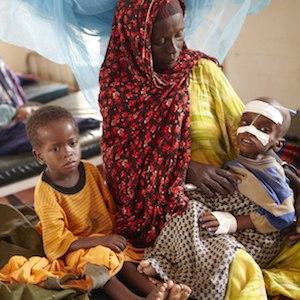What's the biggest, deadliest threat the world faces today? How a person answers that question reveals a lot about them.
Epidemiologists and microbiologists fear pandemics, economists fret over depressions, and foreign policy analysts fear war. Political partisans will often say something flip -- like Donald Trump or Hillary Clinton -- but the upside is that you no longer have to take that individual seriously.
Those who fancy themselves enlightened are likely to answer climate change, but like Paul Ehrlich's Population Bomb, this is simply the apocalypse du jour. Climate change is a slow-moving threat whose consequences are in the medium- to long-term future, not the near-term. In that way, it's sort of akin to the national debt. The U.S. isn't going bankrupt tomorrow, and the world isn't going to boil over tomorrow. With incremental change, we can mitigate these problems and focus on the life-or-death issues facing us right now.
So, what is the single biggest life-or-death issue facing the world? Poverty.
Poverty Indirectly Kills Millions of People Every Year
Citizens in developed countries don't fully grasp how poverty ravages the globe. About 1.3 billion people don't have electricity, which means not only do they spend a considerable amount of time in the dark, but they also lack adequate access to healthcare and the modern digital economy. As TIME magazine poignantly stated, "You're desperately poor — and the lack of electricity helps to ensure that you'll stay that way."
Consider this jaw-dropping statistic from the World Health Organization: Every single year, about 5.6 million children under the age of 5 die, more than half of whom could have been saved with "simple, affordable interventions." Causes of death include preterm birth complications, diarrhea, and malaria.
Stop and think about that number: 5.6 million. That's roughly the same size as the entire Atlanta metropolitan area. Imagine a city that size filled only with children aged 4 and younger. Now, imagine that city being wiped off the map. Every year. That's the scope of the problem that global poverty presents.
Eliminating the causes of poverty is much easier said than done. Global poverty isn't the result of "the wealthy 1%," greedy corporations, or exploitation by the West. Instead, as Charles Wheelan describes in his book Naked Economics, impoverished nations usually have some combination of the following: (1) corrupt or ineffective government; (2) excessive regulation; (3) a "closed" society (e.g., it is not open to trade); and (4) a lack of infrastructure, property rights, and/or human capital.
Therefore, fixing poverty isn't simply a matter of charitable organizations writing sufficiently large checks, though they certainly have an important role to play. But it's worth noting that money alone can't solve the problem.
A World Without Poverty
A world completely free of poverty is not possible. But a world with far fewer impoverished people certainly is. That is a very worthy goal because a wealthier world is a healthier world. Fewer children will die, infectious diseases will continue to decline, and lifespans will increase. These are achievable objectives. We know this because that is what happened in developed countries all over the world.
Indeed, the world's #1 problem is poverty, and the #1 solution is helping developing countries become more like developed countries. Often times, that means do-gooders ought to spend more time fixing boring stuff, like building roads and expanding electrical grids. Not only is this solution practical, it is realistic and morally just because it emphasizes the dignity of the human being. It attempts to maximize human flourishing. Any policy that attempts to change the world must make that its primary aim.




